China Brands, Marketing & Consumers
Christmas in China: Santa Claus is Coming
Christmas is said to be a time for getting together to put up the tree and enjoy a good meal with family and friends, but what do netizens in China have to say about the holiday? Christmas in China: Is Santa Taking Over the People’s Republic?
Published
8 years agoon

Christmas is said to be a time for getting together to put up the tree and enjoy a good meal with family and friends, but what do netizens in China have to say about the holiday? What’s on Weibo’s Cat Hanson looks into the extent to which the Christmas season is embraced in China.
At this time of year, communities across the world are gearing up to celebrate Christmas. In the United Kingdom, many will be preparing turkey and crackers for the 25th of December. In Russian Orthodox communities, January 7th is the day for sweet treats and festivities.
In China, a predominantly atheist country with a small proportion of Christians, Christmas is just another working day. However, the Chinese Christmas experience has been gradually changing over the recent years.
Chinese businesses increasingly have started to incorporate a commercial Christmas theme into their winter seasons. It has sparked online discussion amongst netizens on what the influx of Jingle Bells at this time of year means to them.
According the Council on Foreign Relations, Chinese law allows what is described as “normal religious activities” that do not “engage in activities that disrupt social order, impair the health of citizens or interfere with the educational system of the state.” The Chinese Communist Party is atheist and Christmas is not a public holiday.
The Mandarin for Christmas (圣诞节, shèngdànjié) roughly translates as “The Festival of the Holy Birth,” however Christmas in China is mostly commercial rather than religious. While some churches will hold Christmas services, Christmas in China mostly seems to be about shopping. Online and in-store, the festive season revolves around retail promotions using secular American and Eurocentric depictions of a white-bearded Santa and reindeer.
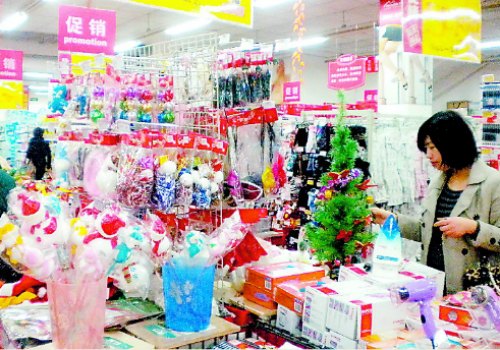
This trend shows no signs of stopping, and the idea of a Christmas period or ‘style’ has been growing year on year. This leads to mixed reactions from those keen to participate and those who are frustrated by the holiday hubbub.
Most Chinese citizens do not observe Christmas Day, but China’s foreigner community is often a source of events and parties organized for those who are away from home during the holidays. In Beijing, for example, a SantaCon event* has been held every December for the past few years. SantaCon participants, both local and foreign, dress as shengdan laoren (Santa Claus), sing Christmas songs, and tour the city together. *(SantaCon is a public gathering of ‘Santas’ for a pubcrawl or other activities, a tradition that started in 1994 San Fransisco).

SantaCon Beijing, via bekkibeijing.blogspot.nl.
Other similarly-themed public and private events involving fancy-dress, karaoke, Christmas dinners and partying are numerous in Beijing and other Chinese cities in December, despite the fact that this may not be the traditional way it is celebrated back home.
“Christmas is the chance to try out new foods and socialize in a style that is different from the norm.”
For many, the Christmas events and parties are just another chance to meet new people and learn more about other cultures. Former Beijing exchange student Raf tells What’s on Weibo: “Oddly enough, [it] isn’t something I’d do back in my hometown – it was something I only participated in during my time as a foreign exchange student in Beijing. It really felt like a great bonding experience of culture-sharing with your fellow expats when you’re handing out candy and singing Western Christmas carols.” Local citizens were “receptive and pretty welcoming in our revelries,” he adds.
For restaurants, the Christmas season is also a great opportunity to provide bespoke menus. Traditional Chinese celebrations such as Spring Festival are the perfect time for Chinese cuisine, however in December, many restaurants in larger international cities have begun to offer menus containing foods like cheese, baked bread and chocolate.
After welcoming esteemed chef Uwe Opocensky, Beef & Liberty Restaurant in Shanghai has noticed a rise in demand for more festive flavours that are not typically found in Chinese cuisine.
“We created a proper Christmas menu for bigger party bookings,” Taylor Yang from Beef & Liberty’s marketing team told What’s on Weibo: “All the items in there are the favorite Beef & Liberty items with some added festival elements. For example, the warm cookie is a regular popular item on our menu, and we added in orange and cinnamon elements to call it our Christmas cookie – it’s definitely a crowd pleaser.”
It seems that part of the appeal of Christmas is the chance to try out new foods and socialize in a style that is different from the norm.
“In China, Christmas is seen as a fashionable expression of the winter season.”
Despite the foods, costumes, and parties, Christmas in China is not entirely imported from a monolithic idea of ‘Western culture.’ Also influencing large portions of the country’s consumers is nearby South Korea, credited for creating a wave of cultural influence over its neighbors via the soft power channels of pop music, films and television.
According to data gathered by the Pew Research Centre in 2010, Christians accounted for just over five percent of the population in China, compared to almost thirty percent in South Korea. One facet of South Korea’s exported cultural wave is that it rarely alters its content for its foreign consumers.

Celebrating Christmas in South Korea, via independent.ie.
It is therefore easy to see why the majority of Korean companies operating in China still offer Christmas promotions, such as cosmetic company Innisfree’s ‘Green Christmas’ range.
Over time, Chinese businesses have also utilized Christmas-themed campaigns. Popular hashtags on Weibo include “The best Christmas presents” (#圣诞节最佳礼物#) and Miaopai’s photography-themed “Snap-Crazy Christmas” (#疯拍圣诞节#). This altogether creates a sense that rather than a religious celebration, Christmas in China is seen as a fashionable expression of the winter season.
Despite South Korea and the many other countries and worldwide communities that celebrate Christmas, in online discussions, Christmas in China is often presented hand-in-hand with the West, described as “a foreign” or “Western” festival. Some worry that the Christmas promotions and deals are incompatible with traditional Chinese culture.
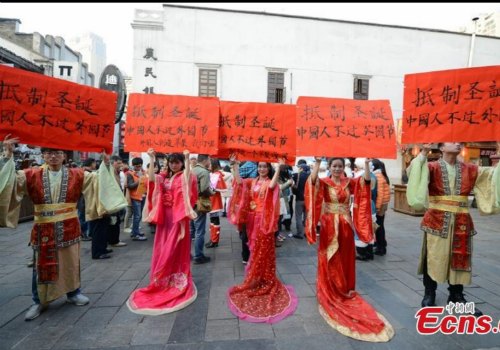
In December 2015 a group of Hunan high school students dressed in traditional Chinese clothing (hanfu), protested by holding red placards reading “Boycott Christmas – don’t celebrate foreign festivals.”
“I don’t believe in Christianity and I don’t believe in God. Why would I celebrate the birth of Jesus?”
In response to these protests, netizen Sakura (@百斩少女刘兔兔), who has over ten thousand followers on Weibo, posted pictures of herself wearing hanfu dress in front of a Christmas tree with the caption “I want to tell everybody, as a true advocate of reviving traditional culture, wonderful cultures from both East and West can coexist. Boycott this negative hype, let’s calmly and confidently walk together.”
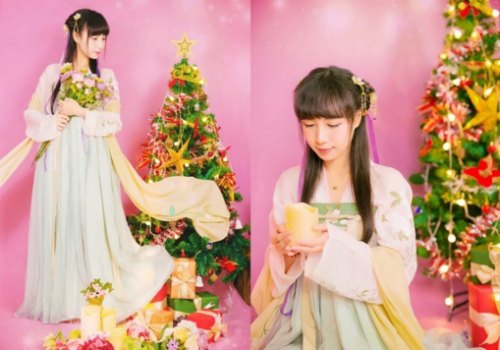
Discussions over the phrase “boycott Christmas” have since been floating around the web. Often in reaction to the commercial hashtags, some netizens express frustration at the festive frenzy and imply that many forget that rather than just an excuse to socialize and buy things, Christmas is primarily a Christian holiday that is not officially celebrated in China.
“Boycott Western Christmas!” says one Weibo user (@不良风气播报员): “People get so excited about Western festivals. The 25th rolls around and there’s so much trash, so many Santa hats, Christmas trees, Christmas clothes, bells, Santas – it all ends up on the trash heap. Protect the environment and boycott Christmas – oh, I mean Jesus’ birthday!”
@NewStar says: “Boycott Christmas. I don’t believe in Christianity and I don’t believe in God. Why would I celebrate the birth of Jesus? I celebrate Spring Festival, and I believe in my ancestors!”
However, others on Weibo use the phrase a little more light-heartedly: “Boycott Christmas, start the countdown to Spring Festival,” one Weibo user says: “But…the Christmas trees and Hello Kitty’s are just so sparkly, I love them.”
“Mother’s Day is from the West, Christmas is also from the West, so why do some people boycott Christmas but celebrate Mothers’ Day?”
Some netizens are purely excited for Christmas-themed coziness, hot chocolate and fairy lights. “Jingle bells, jingle bells, jingle all the way!” writes @LittleGoddessClassroom adding a Santa emoji: “I heard we’re posting Christmas pictures. Good stuff is coming our way!”
In the midst of the debate, some have also explained that boycotting Christmas is not necessarily a matter of ‘East vs West’, but more about maintaining what they view to be traditional Chinese culture: “Mother’s Day is from the West, Christmas is also from the West, so why do some people boycott Christmas and yet rightly celebrate Mothers’ Day?” writes @MrJ-fans.
In a Weibo blog post, one author (@祝太太像宋慧乔) wrote that while Christmas is too small-scale to threaten traditional Chinese festivals, young people in particular embrace Christmas not necessarily for cultural reasons, but, as in the aforementioned fancy-dress events, in order to socialize: “Christmas is about merriment, getting together and enjoying oneself. Christmas songs, Christmas trees, Santa and presents are all for this purpose. You’d be hard-pressed to find another traditional holiday that has so many festive elements.”
Despite varied responses, the general consensus seems to be that while many are getting into the seasonal spirit, most netizens are mostly looking forward to the approaching Spring Festival.
China’s recent restaurant promotions, business campaigns, and online trends show that with the growth of globalization, there is an increased desire to engage with ‘trends’ and cultures from across the world. Nevertheless, it is unlikely that traditional Chinese culture, nor the Chinese internet, will be hijacked by Christmas hashtags anytime soon; the revelry surrounding Christmas is still vastly surpassed by the festivities that take place during the Chinese Lunar New Year.
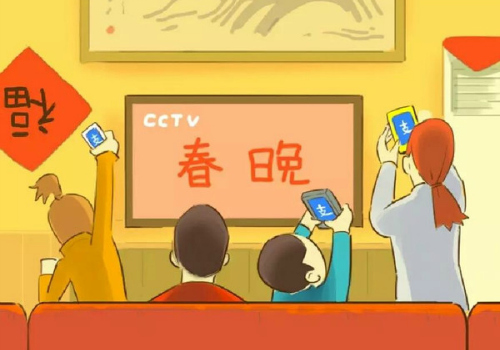
Let’s not forget that China’s annual televised Spring Festival Gala remains one of the most-watched programs in the world. Despite the Santa hats and Christmas decoration, many stores in China have already begun selling the scarlet Chinese New Year decorations.
By Cat Hanson
Follow @WhatsOnWeibo
Disclaimer: Beef & Liberty restaurant is in no way affiliated with whatsonweibo.com or the opinions expressed by others in this.
©2016 Whatsonweibo. All rights reserved. Do not reproduce our content without permission – you can contact us at info@whatsonweibo.com.
Cat Hanson is a U.K. graduate of Chinese Studies now teaching and living in China. She swapped Beijing for Anhui, and runs her own blog on China life: Putong Press.

China Books & Literature
Why Chinese Publishers Are Boycotting the 618 Shopping Festival
Bookworms love to get a good deal on books, but when the deals are too good, it can actually harm the publishing industry.
Published
2 months agoon
June 8, 2024By
Ruixin Zhang
JD.com’s 618 shopping festival is driving down book prices to such an extent that it has prompted a boycott by Chinese publishers, who are concerned about the financial sustainability of their industry.
When June begins, promotional campaigns for China’s 618 Online Shopping Festival suddenly appear everywhere—it’s hard to ignore.
The 618 Festival is a product of China’s booming e-commerce culture. Taking place annually on June 18th, it is China’s largest mid-year shopping carnival. While Alibaba’s “Singles’ Day” shopping festival has been taking place on November 11th since 2009, the 618 Festival was launched by another Chinese e-commerce giant, JD.com (京东), to celebrate the company’s anniversary, boost its sales, and increase its brand value.
By now, other e-commerce platforms such as Taobao and Pinduoduo have joined the 618 Festival, and it has turned into another major nationwide shopping spree event.
For many book lovers in China, 618 has become the perfect opportunity to stock up on books. In previous years, e-commerce platforms like JD.com and Dangdang (当当) would roll out tempting offers during the festival, such as “300 RMB ($41) off for every 500 RMB ($69) spent” or “50 RMB ($7) off for every 100 RMB ($13.8) spent.”
Starting in May, about a month before 618, the largest bookworm community group on the Douban platform, nicknamed “Buying Like Landsliding, Reading Like Silk Spinning” (买书如山倒,看书如抽丝), would start buzzing with activity, discussing book sales, comparing shopping lists, or sharing views about different issues.

Social media users share lists of which books to buy during the 618 shopping festivities.
This year, however, the mood within the group was different. Many members posted that before the 618 season began, books from various publishers were suddenly taken down from e-commerce platforms, disappearing from their online shopping carts. This unusual occurrence sparked discussions among book lovers, with speculations arising about a potential conflict between Chinese publishers and e-commerce platforms.
A joint statement posted in May provided clarity. According to Chinese media outlet The Paper (@澎湃新闻), eight publishers in Beijing and the Shanghai Publishing and Distribution Association, which represent 46 publishing units in Shanghai, issued a statement indicating they refuse to participate in this year’s 618 promotional campaign as proposed by JD.com.
The collective industry boycott has a clear motivation: during JD’s 618 promotional campaign, which offers all books at steep discounts (e.g., 60-70% off) for eight days, publishers lose money on each book sold. Meanwhile, JD.com continues to profit by forcing publishers to sell books at significantly reduced prices (e.g., 80% off). For many publishers, it is simply not sustainable to sell books at 20% of the original price.
One person who has openly spoken out against JD.com’s practices is Shen Haobo (沈浩波), founder and CEO of Chinese book publisher Motie Group (磨铁集团). Shen shared a post on WeChat Moments on May 31st, stating that Motie has completely stopped shipping to JD.com as it opposes the company’s low-price promotions. Shen said it felt like JD.com is “repeatedly rubbing our faces into the ground.”
Nevertheless, many netizens expressed confusion over the situation. Under the hashtag topic “Multiple Publishers Are Boycotting the 618 Book Promotions” (#多家出版社抵制618图书大促#), people complained about the relatively high cost of physical books.
With a single legitimate copy often costing 50-60 RMB ($7-$8.3), and children’s books often costing much more, many Chinese readers can only afford to buy books during big sales. They question the justification for these rising prices, as books used to be much more affordable.
Book blogger TaoLangGe (@陶朗歌) argues that for ordinary readers in China, the removal of discounted books is not good news. As consumers, most people are not concerned with the “life and death of the publishing industry” and naturally prefer cheaper books.
However, industry insiders argue that a “price war” on books may not truly benefit buyers in the end, as it is actually driving up the prices as a forced response to the frequent discount promotions by e-commerce platforms.
China News (@中国新闻网) interviewed publisher San Shi (三石), who noted that people’s expectations of book prices can be easily influenced by promotional activities, leading to a subconscious belief that purchasing books at such low prices is normal. Publishers, therefore, feel compelled to reduce costs and adopt price competition to attract buyers. However, the space for cost reduction in paper and printing is limited.
Eventually, this pressure could affect the quality and layout of books, including their binding, design, and editing. In the long run, if a vicious cycle develops, it would be detrimental to the production and publication of high-quality books, ultimately disappointing book lovers who will struggle to find the books they want, in the format they prefer.
This debate temporarily resolved with JD.com’s compromise. According to The Paper, JD.com has started to abandon its previous strategy of offering extreme discounts across all book categories. Publishers now have a certain degree of autonomy, able to decide the types of books and discount rates for platform promotions.
While most previously delisted books have returned for sale, JD.com’s silence on their official social media channels leaves people worried about the future of China’s publishing industry in an era dominated by e-commerce platforms, especially at a time when online shops and livestreamers keep competing over who has the best book deals, hyping up promotional campaigns like ‘9.9 RMB ($1.4) per book with free shipping’ to ‘1 RMB ($0.15) books.’
This year’s developments surrounding the publishing industry and 618 has led to some discussions that have created more awareness among Chinese consumers about the true price of books. “I was planning to bulk buy books this year,” one commenter wrote: “But then I looked at my bookshelf and saw that some of last year’s books haven’t even been unwrapped yet.”
Another commenter wrote: “Although I’m just an ordinary reader, I still feel very sad about this situation. It’s reasonable to say that lower prices are good for readers, but what I see is an unfavorable outlook for publishers and the book market. If this continues, no one will want to work in this industry, and for readers who do not like e-books and only prefer physical books, this is definitely not a good thing at all!”
By Ruixin Zhang, edited with further input by Manya Koetse
Independently reporting China trends for over a decade. Like what we do? Support us and get the story behind the hashtag by subscribing:
Spotted a mistake or want to add something? Please let us know in comments below or email us. First-time commenters, please be patient – we will have to manually approve your comment before it appears.
©2024 Whatsonweibo. All rights reserved. Do not reproduce our content without permission – you can contact us at info@whatsonweibo.com.
China Brands, Marketing & Consumers
Chinese Sun Protection Fashion: Move over Facekini, Here’s the Peek-a-Boo Polo
From facekini to no-face hoodie: China’s anti-tan fashion continues to evolve.
Published
2 months agoon
June 6, 2024
It has been ten years since the Chinese “facekini”—a head garment worn by Chinese ‘aunties’ at the beach or swimming pool to prevent sunburn—went international.
Although the facekini’s debut in French fashion magazines did not lead to an international craze, it did turn the term “facekini” (脸基尼), coined in 2012, into an internationally recognized word.

The facekini went viral in 2014.
In recent years, China has seen a rise in anti-tan, sun-protection garments. More than just preventing sunburn, these garments aim to prevent any tanning at all, helping Chinese women—and some men—maintain as pale a complexion as possible, as fair skin is deemed aesthetically ideal.
As temperatures are soaring across China, online fashion stores on Taobao and other platforms are offering all kinds of fashion solutions to prevent the skin, mainly the face, from being exposed to the sun.

One of these solutions is the reversed no-face sun protection hoodie, or the ‘peek-a-boo polo,’ a dress shirt with a reverse hoodie featuring eye holes and a zipper for the mouth area.

This sun-protective garment is available in various sizes and models, with some inspired by or made by the Japanese NOTHOMME brand. These garments can be worn in two ways—hoodie front or hoodie back. Prices range from 100 to 280 yuan ($13-$38) per shirt/jacket.

The no-face hoodie sun protection shirt is sold in various colors and variations on Chinese e-commerce sites.
Some shops on Taobao joke about the extreme sun-protective fashion, writing: “During the day, you don’t know which one is your wife. At night they’ll return to normal and you’ll see it’s your wife.”

On Xiaohongshu, fashion commenters note how Chinese sun protective clothing has become more extreme over the past few years, with “sunburn protection warriors” (防晒战士) thinking of all kinds of solutions to avoid a tan.

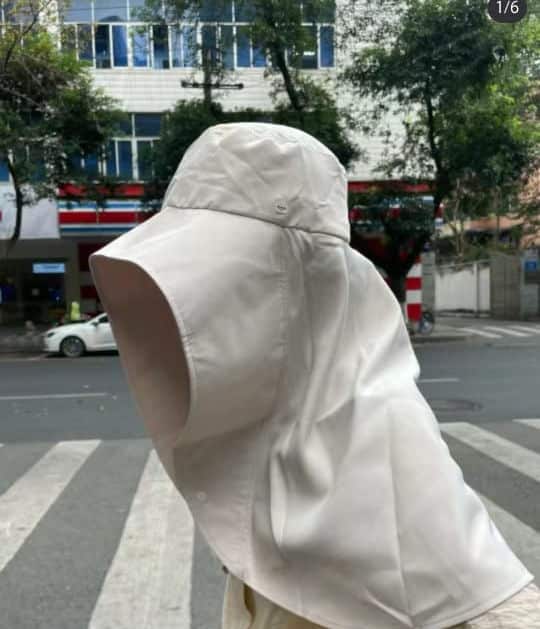


Although there are many jokes surrounding China’s “sun protection warriors,” some people believe they are taking it too far, even comparing them to Muslim women dressed in burqas.
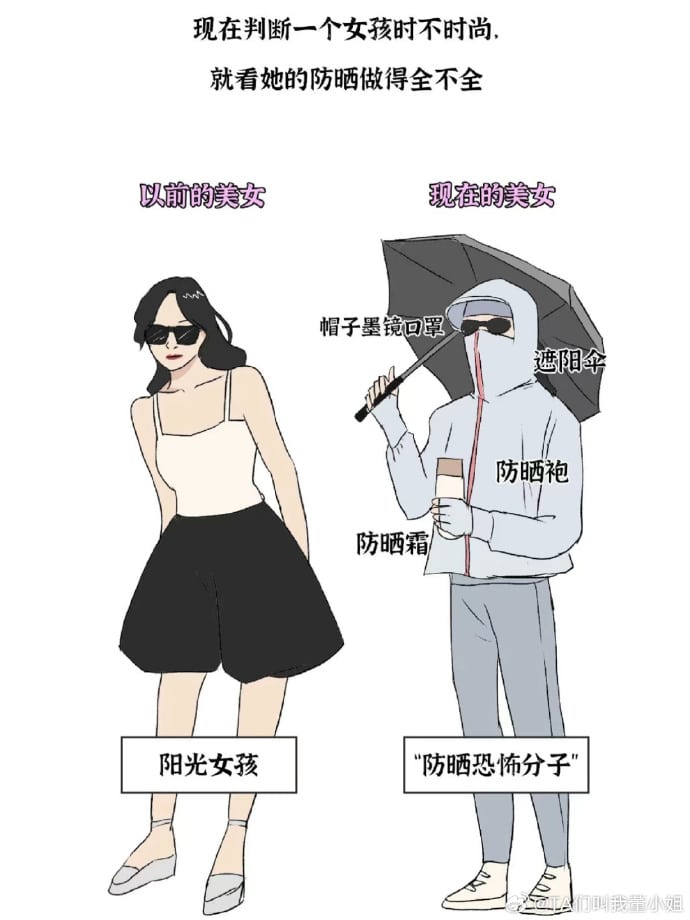
Image shared on Weibo by @TA们叫我董小姐, comparing pretty girls before (left) and nowadays (right), also labeled “sunscreen terrorists.”
Some Xiaohongshu influencers argue that instead of wrapping themselves up like mummies, people should pay more attention to the UV index, suggesting that applying sunscreen and using a parasol or hat usually offers enough protection.
By Manya Koetse, with contributions by Miranda Barnes
Spotted a mistake or want to add something? Please let us know in comments below or email us. First-time commenters, please be patient – we will have to manually approve your comment before it appears.
©2024 Whatsonweibo. All rights reserved. Do not reproduce our content without permission – you can contact us at info@whatsonweibo.com.
Subscribe

Weibo Watch: The Future is Here

“Bye Bye Biden”: Biden’s Many Nicknames in Chinese

Enjoying the ‘Sea’ in Beijing’s Ditan Park

A Triumph for “Comrade Trump”: Chinese Social Media Reactions to Trump Rally Shooting

Weibo Watch: Get Up, Stand Up

The Tragic Story of “Fat Cat”: How a Chinese Gamer’s Suicide Went Viral

“Old Bull Eating Young Grass”: 86-Year-Old Chinese Painter Fan Zeng Marries 36-Year-Old Xu Meng

A Brew of Controversy: Lu Xun and LELECHA’s ‘Smoky’ Oolong Tea

Singing Competition or Patriotic Fight? Hunan TV’s ‘Singer 2024’ Stirs Nationalistic Sentiments

Zara Dress Goes Viral in China for Resemblance to Haidilao Apron

Weibo Watch: The Battle for the Bottom Bed

About the “AI Chatbot Based on Xi Jinping” Story

China’s Intensified Social Media Propaganda: “Taiwan Must Return to Motherland”

Weibo Watch: Telling China’s Stories Wrong

Saying Goodbye to “Uncle Wang”: Wang Wenbin Becomes Chinese Ambassador to Cambodia
Get in touch
Would you like to become a contributor, or do you have any tips or suggestions? Get in touch here!
Popular Reads
-

 China Insight3 months ago
China Insight3 months agoThe Tragic Story of “Fat Cat”: How a Chinese Gamer’s Suicide Went Viral
-

 China Music4 months ago
China Music4 months agoThe Chinese Viral TikTok Song Explained (No, It’s Not About Samsung)
-

 China Digital10 months ago
China Digital10 months agoToo Sexy for Weibo? Online Discussions on the Concept of ‘Cābiān’
-

 China Arts & Entertainment12 months ago
China Arts & Entertainment12 months agoBehind 8 Billion Streams: Who is Dao Lang Cursing in the Chinese Hit Song ‘Luocha Kingdom’?



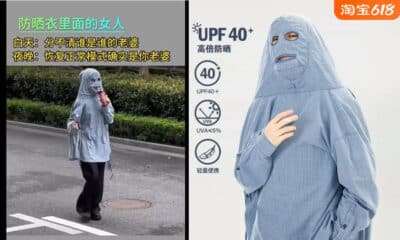


Zach Lucas
December 22, 2016 at 11:03 pm
In America so many Christmas gifts, so little thought behind them:
https://www.youtube.com/watch?v=kUkWq58Sx9o